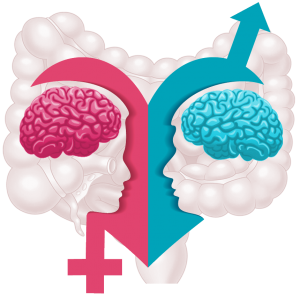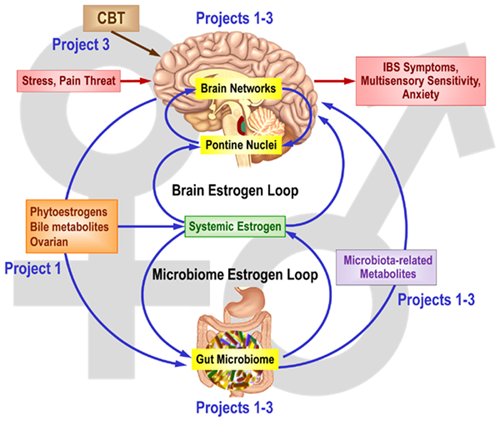Sex Related Differences in Brain Gut Microbiome Interactions in Irritable Bowel Syndrome
 The UCLA Specialized Center of Research Excellence (SCORE) aims to gain a better understanding of the role of the gut microbiome and female sex hormones in the modulation of brain gut microbiome interactions in two of the most common disorders of the gastrointestinal tract, irritable bowel syndrome (IBS) and chronic functional constipation. These studies will provide valuable insights on the pathophysiology and treatment of these conditions.
The UCLA Specialized Center of Research Excellence (SCORE) aims to gain a better understanding of the role of the gut microbiome and female sex hormones in the modulation of brain gut microbiome interactions in two of the most common disorders of the gastrointestinal tract, irritable bowel syndrome (IBS) and chronic functional constipation. These studies will provide valuable insights on the pathophysiology and treatment of these conditions. |
 |
| Emeran Mayer, MD SCORE MPI |
Lin Chang, MD SCORE MPI |
The Center has been funded by an NIH P50 grant from the NIH Office of Research on Women’s Health (ORWH) and the National Institute of Diabetes and Digestive and Kidney Diseases (NIDDK) since 2002.
There is a close synergistic interaction between the UCLA SCORE (focusing on IBS) and the other UCLA SCORE (studying sex differences in metabolism) and the MAPP Research Network (focusing on chronic urological pain conditions). Our UCLA SCORE is the only interdisciplinary and translational research and clinical program focused on a better understanding and better treatment of some of the most common persistent visceral pain disorders in the country.
OVERVIEW
This SCORE proposal aims to gain a better understanding of the role of the gut microbiome and female sex hormones in the modulation of brain gut microbiome interactions in two of the most common disorders of the gastrointestinal tract, irritable bowel syndrome (IBS) and chronic functional constipation.
The UCLA SCORE is organized into three highly interdependent and synergistic Projects and Cores which are studying different aspects of the BGM with a focus on the role of SABV in modulating brain networks and the gut microbiome. Our BGM model for IBS with sex as a biologic variable demonstrates the bidirectional interactions between brain, gut, gut microbiome and estrogen. At the brain level, bidirectional interactions exist between cortical networks and pontine nuclei. The aspects of the model addressed by the 3 SCORE Projects are shown.

RESEARCH PROJECTS
The three well-integrated translational research projects will investigate sex differences in brain gut microbiome interaction in IBS.
Project 1: The role of brain-gut microbiome interactions in mediating IBS and constipation symptoms during menses and menopause
Co-Leads: Lin Chang, MD and Arpana Gupta, PhD
Project 2: Sex-related differences in structure, function and connectivity of central arousal and salience networks involving brainstem nuclei are involved in IBS symptom generation
Co-Leads: Jennifer Labus, PhD and Benjamin Ellingson, PhD
Project 3: Sex related differences in the effect of cognitive behavioral therapy on emotional arousal and salience circuits and the role of the gut microbiome
Co-Leads: Emeran Mayer, MD and Bruce Naliboff, PhD
CORES
Leadership Administrative Core (LAC)
Co-Leads: Emeran Mayer, MD and Lin Chang, MD
SCORE Administrator: Melenie Rosales
The LAC provides intellectual leadership and administrative support for the activities of the UCLA SCORE and the SCORE consortium.
Career Enhancement Core (CEC)
Co-Leads: Lin Chang, MD and Emeran Mayer, MD
The Career Enhancement Core (CEC) will be responsible for implementing innovative programs to enhance collaborations, training, education, recruitment of new investigators, and community outreach.
Data Processing and Analysis Core (DPAC)
Sub-Cores: Neuroimaging (Co-Lead: Arpana Gupta, PhD); Bioinformatics (Co-Lead: Jennifer Labus, PhD) and Microbiome (Co-Lead: Jonathan Jacobs, MD, PhD)
This core provides a wide range of statistical and bioinformatics services for the analysis and interpretation of brain imaging data and microbiome data, including the multiomics integration of anthropomorphic, behavioral, microbiome and brain imaging data, and the use of deep learning and neural network analytical approaches to existing large data sets.
EXTERNAL ADVISORY BOARD
Tracey Bale, PhD
Director, Center for Epigenetic Research in Child Health and Brain Development, University of Maryland School of Medicine
Jeffrey Lackner, PsyD
Professor with Tenure Chief, Division of Behavioral Medicine, Department of Medicine, Jacobs School of Medicine & Biomedical Sciences, University of Buffalo
Margaret Heitkemper, RN, PhD, FAAN
Chair, Department of Biobehavioral Nursing and Health Informatics, The Elizabeth Sterling Soule Endowed Chair in Nursing, University of Washington
Kjersti Aagaard, MD, PhD, MScCI
Professor, Maternal-Fetal Medicine and Vice Chair of Research, Baylor College of Medicine
